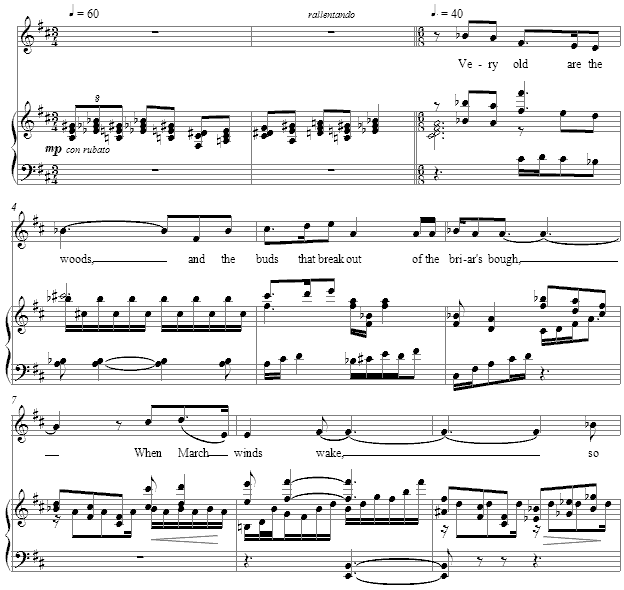Music and Texts of GARY BACHLUND
Vocal Music | Piano | Organ | Chamber Music | Orchestral | Articles and Commentary | Poems and Stories | Miscellany | FAQs
All That's Past - (1986)
Walter de la Mare
for medium voice and piano
to the memory of Larry Stayer [ 1 ]
Very old are the woods;
And the buds that break
Out of the brier's boughs,
When March winds wake,
So old with their beauty are--
Oh, no man knows
Through what wild centuries
Roves back the rose.
Very old are the brooks;
And the rills that rise
Where snow sleeps cold beneath
The azure skies
Sing such a history
Of come and gone,
Their every drop is as wise
As Solomon.
Very old are we men;
Our dreams are tales
Told in dim Eden
By Eve's nightingales;
We wake and whisper awhile,
But, the day gone by,
Silence and sleep like fields
Of amaranth lie. [ 2 ]from The Listeners and Other Poems [1912]
[ 4 pages, circa 3' 00" ]

Walter de la Mare
Owen Barfield: "Walter de la Mare questioned everything, including - or rather above all - the things that everyone round him had become quite sure about. But he rarely or never stayed for an answer. He just went on writing with an unfettered mind unfettered poetry." This is a key to one aspect of the creative act, wherein dwelling too long and indulging in too deep or harsh a self-criticism is absent for reason of more facilely continuing the creativity itself, leaving the criticism to others who in dwelling on this other human pursuit near no closer to understanding the act of creativity when all is said and done.
Other poems of de la Mare are set in the song anthology, Pieces of Peacock Pie, and a short cycle for mezzo soprano entitled Three Poems of Walter de la Mare, which include "Alas, Alack!," " The Song of the Shadows" and "Silver." On that page as well, one may read more about this wondrous poet.
The gentle polytonal setting is sometimes lightly rhapsodic, and the polytonality hints at both the major and minor thirds of as a common tone between juxtaposed tonal regions, such as in measure four where the B-flat might function both as a major third within the F-sharp minor chord, but also as an upper neighbor to A in the following measure's tonality. Throughout, expressive rubati are recommended to performers.
The score is available as a free PDF download, though any major commercial performance or recording of the work is prohibited without prior arrangement with the composer. Click on the graphic below for this piano-vocal score.
NOTES
[ 1 ] Lawrence F. Stayer (1941-1990) was the executive director of the Metropolitan Opera National Council Auditions. A native of Olean, N.Y., Larry studied voice at the Eastman School of Music in Rochester. In 1967 he became an assistant manager of the Metropolitan Opera Studio, an adjunct that trains young singers. Five years later he became an artistic administrator for the company, working on casting and scheduling. In 1980, Mr. Stayer helped form the Metropolitan Opera Young Artist Development Program and was named its administrator shortly afterward. He succeeded the soprano Rise Stevens in 1988 as the executive director of the National Council Auditions. I met Larry at an audition at the Met in 1986, wherein he invited me to participate in the Young Artists Program, covering many lead roles and singing smaller parts for several years. When I chose to take some work in Europe rather than return to smaller roles at the Met, Larry was "officially" angry with me and yet, sweetly, privately encouraging, as were tenor Timothy Jenkins, and bass baritone Sir Donald MacIntyre. A smoker, Larry's NY Times obituary documents death due to cancer aggravated by pneumonia. After his passing, I changed the score's dedication to him to read "in memory of" him.
[ 2 ] The amaranths (also known quite commonly as pigweed) is of the genus Amaranthus, a genus of short-lived herb found in temperate regions and climates. Its blossoms range from purple and red to gold, as there are about sixty Amaranthus species. Several are grown as leaf vegetables and for cereal grain, as well as ornamental plants. Amaranth grain is of some importance in the Himalayas, and was one of the staples of the Incas, known as kiwicha in the modern Andes. Used by the Aztecs, who called it huautli, and other Amerindian peoples in the Americas, it was used to make ritual drinks and foods.
